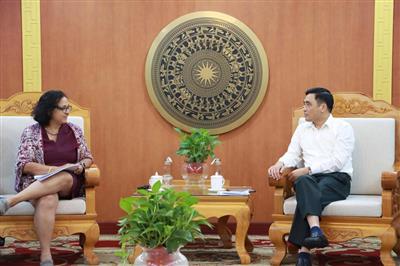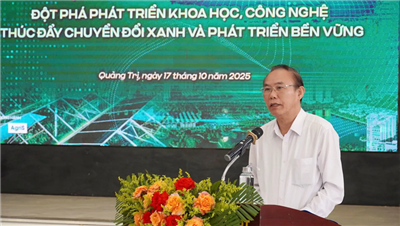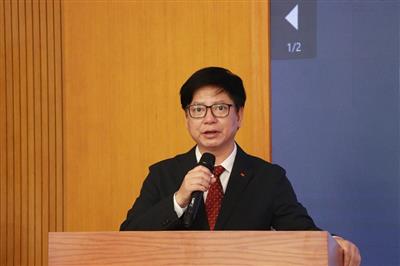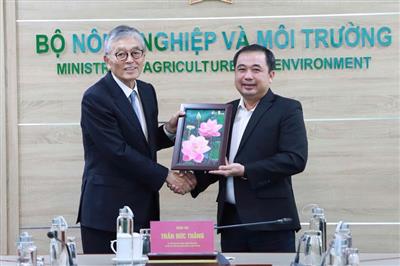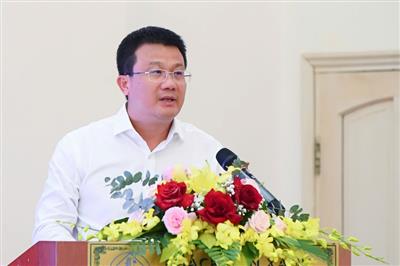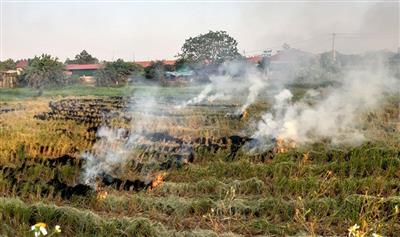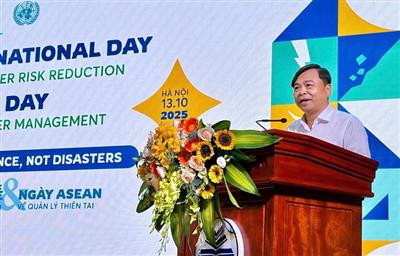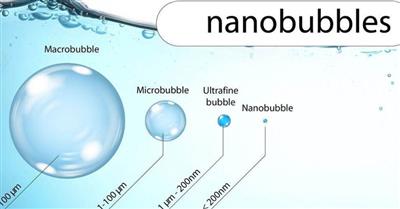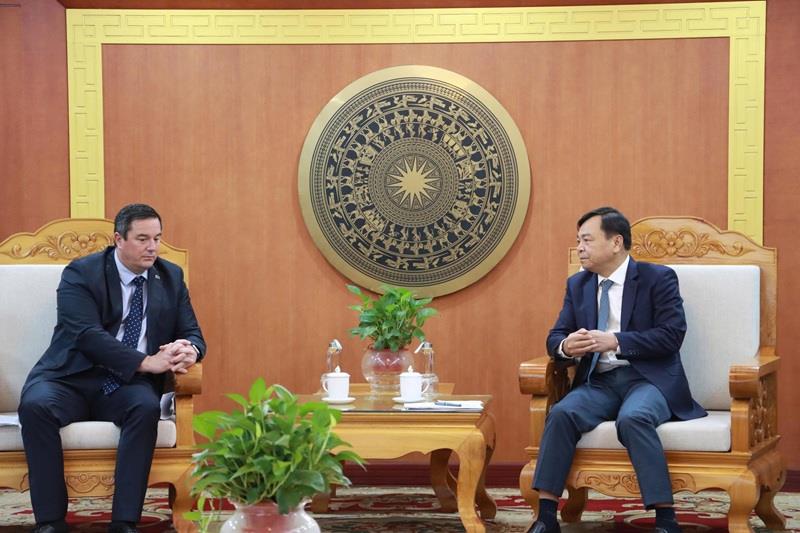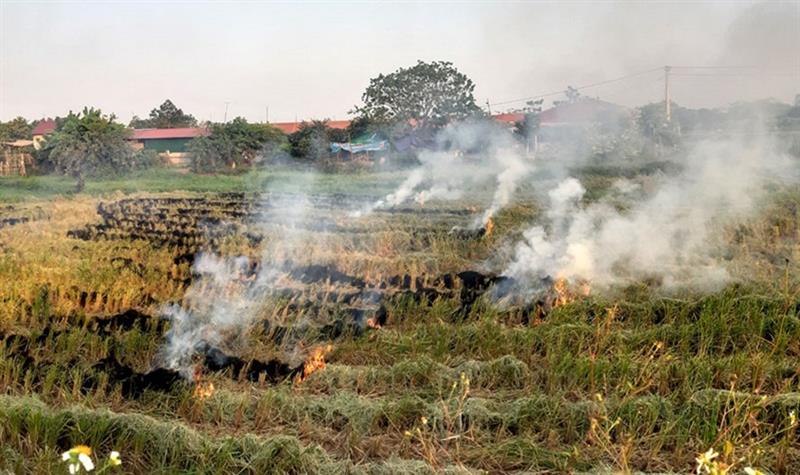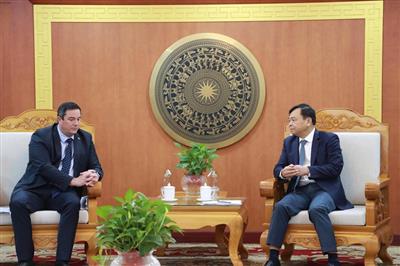
Science and innovation: Keys to advancing OCOP in the transformation of agri-food systems
15/07/2025TN&MTAs countries across Asia and the Pacific work to transform their agri-food systems, science and innovation are increasingly seen as essential drivers in advancing the OCOP model toward the “Four Betters”: Better Production, Better Nutrition, Better Environment, and Better Life. This was the overarching message at the special dialogue held under the High-Level Interregional Knowledge Exchange on OCOP models, co-organized by the Ministry of Agriculture and Environment of Vietnam and FAO, on 15 July 2025 in Hanoi.
The session brought together ministers from Asia and Africa, along with experts from FAO, UNESCAP, and regional academic institutions, to exchange experiences, innovations, and models for building inclusive, sustainable, and resilient food systems.
From local to global: Scaling OCOP through a unified vision and shared innovation
Dr Jingyuan Xia, Executive Secretary, OCOP Secretariat; Special Advisor to the Director-General, Vice of the Director-General (ODG), OCOP Secretariat, FAO
.jpeg)
At FAO, we launched the One Country One Priority Product (OCOP) initiative in 2021 as a response to the growing and complex challenges facing global agri-food systems, population growth, climate change, natural resource depletion, and environmental degradation. Four key dimensions deserve attention when assessing the OCOP initiative: its rationale, the actions implemented, notable progress achieved so far, and the path ahead.
Our central idea is to pursue a ‘more–less–better’ approach: more productivity, more diversity, more food safety, more profitability, and more sustainability; less food loss, fewer agricultural inputs, less environmental pollution, and lower carbon emissions. These goals support the transformation towards four better outcomes: Better Production, Better Nutrition, Better Environment, and Better Life. OCOP functions as a practical tool for optimizing positive aspects of agri-food value chains while minimizing negative impacts on people and the planet.
To date, OCOP has engaged 95 countries, with 56 priority products identified across five agricultural sectors, crops, livestock, fisheries, forestry, and integrated systems. Tropical countries have shown particularly strong participation. I highlighted in my presentation that countries in Asia and the Pacific are especially active, with full regional engagement. Viet Nam, in particular, was referenced as an example where OCOP implementation aligns with national efforts toward green development. The country has demonstrated promising early results in applying green practices across the value chain, from production and storage to processing and marketing.
Looking ahead, we aim to ensure that all participating countries have active projects, build stronger synergies with other FAO initiatives such as Hand-in-Hand, Digital Villages, and Green Cities, and enhance global visibility for OCOP through events and exhibitions. One upcoming milestone will be the first Global OCOP Exhibition scheduled for October, themed ‘From Seed to Food,’ where we hope to showcase the collective potential of OCOP to drive sustainable agri-food systems transformation.
Strengthening regional coordination for OCOP through science and innovation
Dr Xuan Li, Senior Policy Officer and Regional OCOP Coordinator, FAO RAP
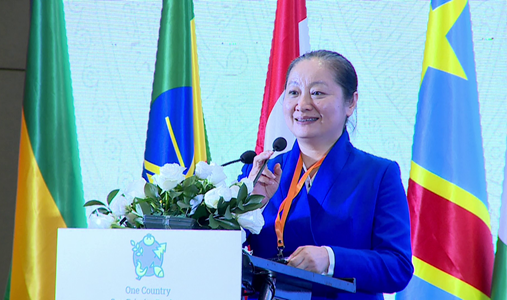
As the Regional OCOP Coordinator for Asia and the Pacific, I have had the opportunity to work with 23 countries implementing the OCOP initiative, featuring 20 distinct Special Agricultural Products (SAPs). This geographic and thematic diversity is both a strength and a challenge, demanding an integrated, interdisciplinary approach.
Under the leadership of our Assistant Director-General, we have built a regional coordination structure that connects all technical domains, from production and trade to nutrition and policy, enabling cross-sectoral collaboration. I believe this strong institutional mechanism is a key factor behind our region’s active participation and innovation in OCOP.
We have developed a regional implementation strategy that translates the global OCOP vision into localized actions. Our efforts rest on three pillars: (1) launching the first Regional OCOP Knowledge Platform among FAO regions; (2) supporting OCOP project implementation at the country level; and (3) building a Regional Science and Innovation Network. This network plays a critical role in aligning stakeholders from various sectors, such as academia, private sector, government, around the "Four Betters" framework. In fact, countries like Viet Nam have shown early leadership in this space, drawing from their experience with the “One Commune One Product” program, which shares conceptual roots with OCOP and has informed our regional learning process.
Our knowledge platform includes technical events, product-focused publications, and case studies to capture implementation insights. For example, we use digital tools like GIS and QR-based traceability systems to enhance the transparency of SAP value chains. These efforts are part of our broader strategy to improve productivity, traceability, competitiveness, and access to healthy diets. Through regional partnerships, such as those with the Chinese Academy of Sciences and Mahidol University, we are developing nutrient-rich recipes, upgrading processing techniques, and analyzing market trends, including for products from Viet Nam and other ASEAN countries.
Looking ahead, we aim to establish regional centers of excellence that link science and innovation directly to field-level practices. Our approach is inclusive: we welcome contributions from within and beyond the region, from science-based institutions to branding experts. I am confident that through continued collaboration, we can build integrated, country-led OCOP projects that deliver on the promise of the Four Betters, better production - better nutrition - better environment - and better life, for all.
Transforming local agricultural products into better nutrition solutions
Prof. Chalat Santivarangkna, Director, Institute of Nutrition of Mahidol University (INMU), Vice-Chair of Regional Organizing Group on OCOP in Asia and the Pacific
.png)
As a nutrition researcher, I believe that healthy diets begin with a deep understanding of the food itself. In the OCOP initiative, our team has been working with four countries (Cambodia, Nepal, Papua New Guinea, and Thailand) analyzing the nutritional profiles of their Special Agricultural Products (SAPs): mango, black cardamom, quinoa, and vanilla.
Each product is unique: for example, mango is rich in sugars and fiber, suitable for food-based innovations, while vanilla, used in small amounts, requires a different formulation approach. Nutrient profiling is the crucial first step in designing food products that deliver better nutrition.
We used the INNuCAL software developed at Mahidol University to formulate recipes digitally based on the nutrient content and functional objectives, whether it’s to enrich with protein, reduce sodium, or improve dietary fiber. This approach allows us to test and modify recipes before actual production. For instance, we created a low-fat, low-sodium mango ice cream using inulin, whey protein, and skim milk, and developed cookies enhanced with cardamom. These product developments demonstrate how SAPs can be transformed into nutritious, value-added foods that appeal to broader markets.
Beyond formulation, we focus heavily on capacity building. We conduct training on food composition analysis, recipe development, and nutrition labeling, especially critical for products aiming for export, where compliance with international regulations is essential. Our programs combine online lectures with hands-on sessions in our nutrition labs, where participants gain experience in analysis and product development using state-of-the-art facilities.
What we’ve learned is that improving nutrition through OCOP requires more than science, it demands simple, scalable innovation and localized solutions. Models like Thailand’s OTOP and Viet Nam’s OCOP show that success comes when communities can apply innovation at the grassroots level. I was particularly impressed by how Viet Nam’s OCOP links local products to broader sustainability and health goals. With the right mix of appropriate technology, capacity development, and storytelling, SAPs can become drivers of not only better nutrition but also inclusive and resilient food systems.
Science and innovation as the foundation for a ‘Better environment’
Prof. Chuang Liu, Vice-Chair of Regional Organizing Group on OCOP in Asia and the Pacific, Institute of Geographic Sciences and Natural Resources Research, Chinese Academy of Sciences (IGSNRR-CAS)
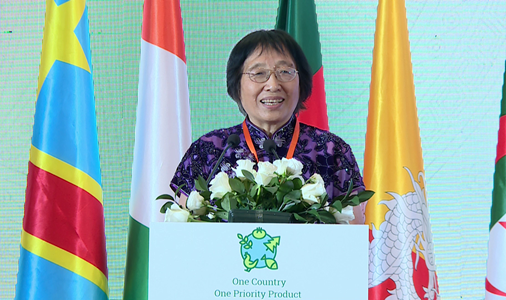
We believe that environmental protection is not only a pillar but a foundation for the sustainable development of agrifood systems. Over the past years, CRAES has collaborated closely with FAO to develop scientific tools that support pollution reduction in agricultural production, especially through integrated life cycle assessment (LCA), monitoring of agrochemical residues, and the control of soil and water quality.
One concrete example is the development of the “3T” toolkit (Tools, Technologies, and Targets) which enables us to assess the environmental performance of OCOP products. In collaboration with regional partners, we have piloted this approach across selected special agricultural value chains. The indicators go beyond greenhouse gas emissions to also include water usage, land degradation, and overall ecological quality.
I particularly commend Viet Nam’s approach to integrating OCOP into its rural development and green transition strategies. Vietnamese OCOP products are gradually enhancing traceability, reducing chemical inputs, and aiming for eco-certification. This not only adds commercial value but also contributes to improving local ecosystems and community well-being. Viet Nam is well-positioned to become a model for using environmental science to lead innovation in specialty agriculture.
To achieve a better environment, we must foster cross-sectoral collaboration, among scientists, policymakers, the private sector, and producers. OCOP offers an ideal platform to pilot and scale up circular, low-emission, and climate-resilient production models. CRAES is committed to continuing its support for FAO and member countries, especially across Asia and the Pacific, in building a more sustainable future together.
Breeding for ‘Better production’: Science, adaptation, and cooperation
Prof. Hui Zhang, Shandong Normal University, China
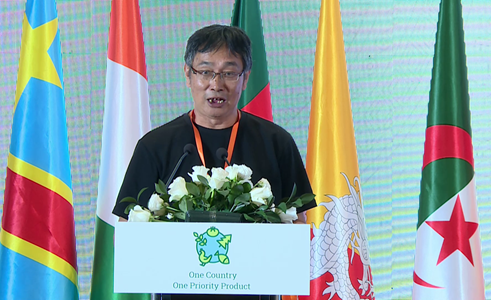
It is a pleasure to share some recent progress from our work on quinoa, one of the world’s most recognized “superfoods.” In China, we have been conducting quinoa breeding for over three years, applying advanced technologies such as genetic analysis, crossbreeding, and multi-environment trials to develop varieties adapted to diverse conditions.
These include saline coastal zones, high-altitude areas in the Himalayas, and drylands receiving less than 300 mm of rainfall annually. Quinoa has demonstrated remarkable adaptability, and its cultivation is expanding in areas where other crops cannot grow.
This work reflects the core of the Better Production philosophy in OCOP: increasing yields and resilience while using fewer natural resources. Our efforts aim not only to improve productivity but also nutritional quality, suitability for modern processing, and compatibility with mechanized farming. These improved quinoa lines can support rural communities through both economic and dietary benefits, while promoting sustainable use of marginal lands.
I would like to emphasize that we are open to cooperation with all countries interested in developing quinoa and other underutilized crops. Through collaboration with FAO and the OCOP regional network, we are ready to share our breeding materials and experiences. We especially welcome partnerships with countries like Viet Nam, which has already demonstrated strong leadership in implementing OCOP and holds great potential in the conservation and development of indigenous crops. We believe that shared efforts in germplasm testing, field trials, and scientific exchange can strengthen OCOP’s impact across Asia and the Pacific.
Ultimately, I believe that modern science and technology, particularly in plant breeding and genetics, are central to Better Production. OCOP provides an ideal platform to connect knowledge with action, transforming local agricultural products into drivers of rural prosperity and environmental sustainability.
Transforming food systems for ‘Better life’ starts with market accessibility
Dr Jing Huang, United Nations Economic -and Social Commission for Asia and the Pacific (UNESCAP)
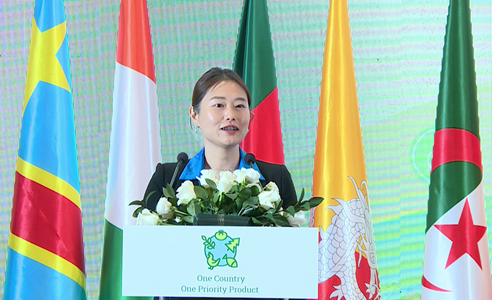
From UNESCAP’s experience, we believe that without improving market accessibility, including data infrastructure, trade intelligence, and standards compliance, even the most promising OCOP products may struggle to make a real difference for local communities. Transformation does not end at production; it must extend across distribution, consumer access, and trade, and this is where science, digitalization, and cross-sector collaboration play a vital role.
In our joint work with FAO, we have developed the “OCOP Market Intelligence Series” to address three critical gaps that many countries face: lack of real-time data, weak market analysis capacity, and limited access to export standards. This series helps countries understand where they stand in global markets, identify promising market entry points, and design more strategic interventions, from traceability and post-harvest handling to quality standardization and trade facilitation.
I deeply appreciate Viet Nam’s proactive and strategic engagement in this cross-sectoral partnership. Viet Nam is not only a frontrunner in national-level OCOP implementation, but also plays an active role in regional collaboration efforts, particularly within the Southeast Asia cluster. This is a region where major investments are being made to improve traceability systems, quality compliance, and market analysis. Viet Nam is emerging as a potential model for using OCOP to transform food systems in a more inclusive and sustainable way.
Looking ahead, we will continue supporting countries, including Viet Nam, through technical assistance, capacity-building workshops, and regional exchanges. These efforts aim to strengthen their ability to build digital traceability systems, comply with international standards, and design sound export strategies. I firmly believe that “Better Life” is not just a slogan. It can become a reality, when local products are empowered to reach global markets through smart, data-informed, and well-coordinated action.
Ngoc Huyen


